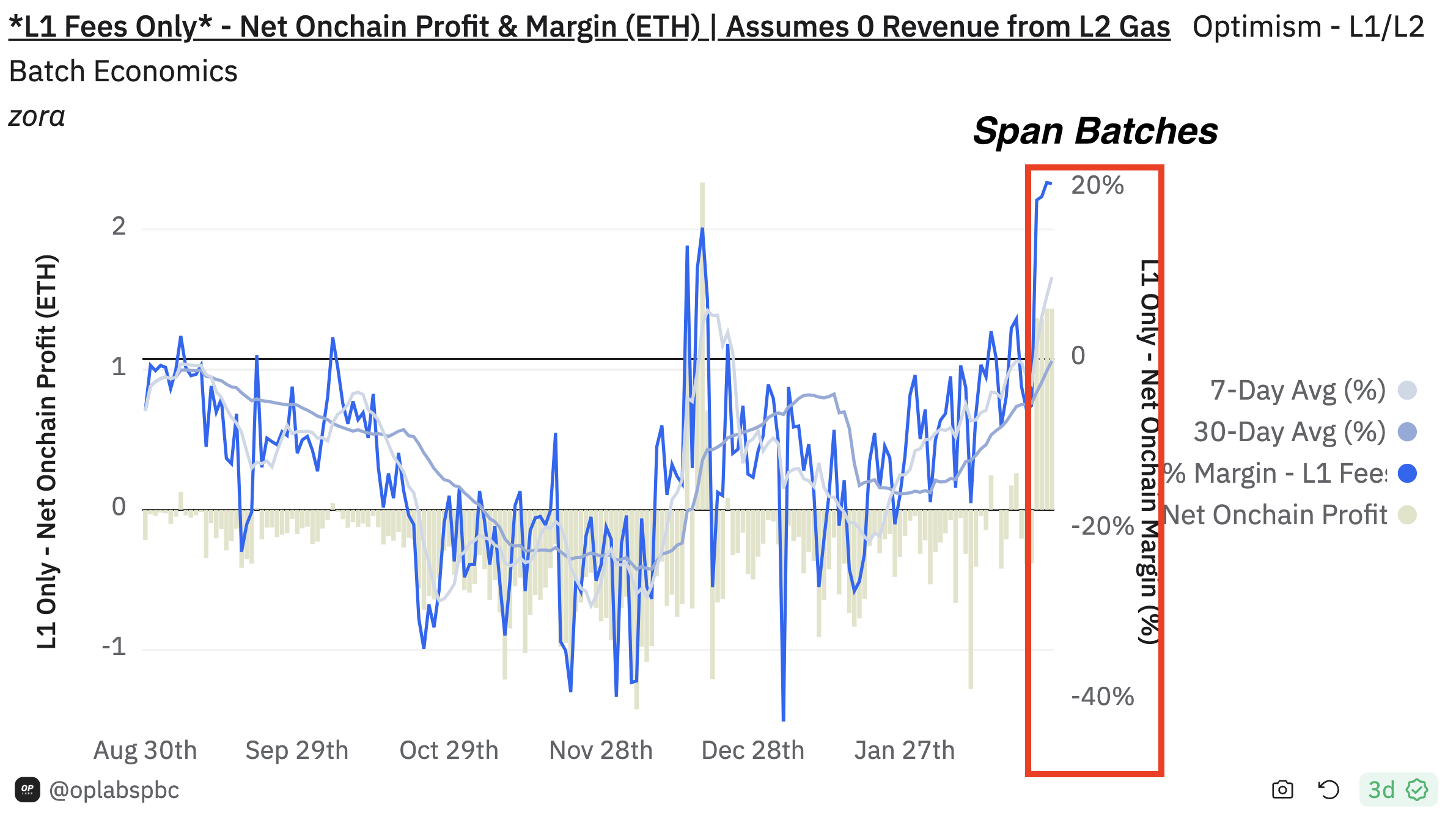How the Delta Upgrade reduced OP Chain fixed costs by over 90%
This blog post shares how Test in Prod built the Delta protocol upgrade, which brought the feature Span Batches, and significant savings, to OP Chain mainnets.

Last week, the Delta hardfork landed on OP Chain Mainnets, including OP Mainnet, Base, Zora Network, and more.
Based on our backtesting results, we expected the Delta upgrade to cut the fixed overhead for all OP Chains’ L1 fees by 6%~11% for performant chains and over 90% for less-active chains. We were able to complete even more optimizations to reduce the fixed onchain overhead for chain operators to run any standard OP Chain by over 90%. We’re happy to report that post-upgrade, these numbers have held true. Zora-sepolia offers a nice visualization of a 90% reduction in fixed onchain overhead costs. Here they are one week before and one week after the testnet upgrade in December 2023:

In practice, this reduction in fixed overhead costs has contributed to other benefits for OP Chain operators. In the example below, you can see that since span batches were introduced, Zora’s net onchain profit has increased significantly, and held consistently.

We expect this upgrade will make it much easier to adopt the OP Stack by alleviating fee burdens for all chain operators. Not only are the numbers impactful, but the journey to build Delta was meaningful as well. We’re excited to share a bit about that journey in this blog post!
What is the Delta Upgrade?
Delta upgrade contained a single consensus feature, Span Batches—a new batching spec built by Test in Prod, leveraging initial designs by Protolambda. Span Batches minimize the v0 batch spec’s overhead by encoding consecutive L2 blocks into one batch. It allows OP Chains to reduce the amount of redundant content that L2s need to post to L1 on every L2 block, lowering the fixed overhead of data that needs to be posted for ALL OP chains.
Last week, Mode network shared a blog post detailing how the Span Batches feature in the Delta Upgrade impacted them directly. It’s worth a read.
Please refer to the Design Docs, Spec Docs, Governance Post, Github Issue Tracker, and Research Repository (Backtesting) for more details!
Test in Prod’s first critical hardfork built as core developers
The Delta hardfork was a consensus-critical upgrade that required extremely delicate engineering and verifications, which makes the entire process a complex. Building this hardfork as a non-original author of the protocol made it even more challenging!
Building a protocol critical feature is not only about the team’s engineering abilities. It can only be done when everything makes sense—our understanding of historical contexts, support from the community & the original author, our team’s motivation to build, etc. Through the power of Optimism, we pulled it off, and it was a joyful experience. Here’s why:
- Open-sourced specs & codes: All codes and specs are open to read & modify. It was easy to build on top of the existing codebase because all code was MIT-licensed, and reading the specs allowed us to easily understand the protocol details.
- OP Labs & Foundation’s support: OP Stack’s codebase is extensive and sophisticated, but with the original author’s support, understanding & writing code becomes way easier. OP Labs & the Optimism Foundation helped us to build Delta successfully and reviewed everything thoroughly.
- Rewarding system: While building the Delta upgrade, we were rewarded for our earlier efforts to build op-erigon through RetroPGF. We felt greatly valued by the Optimism community and badgeholders, which motivated us in our efforts to build another piece of critical infrastructure for the ecosystem!
- The Collective’s prioritization of social decentralization: Everyone in the Collective was super cheerful for us to build and ship Delta, and supported us through the process. This was also highly motivating because we felt like we were a crucial part of the team, and that we are all heading toward the same goal together! It gave meaning to our hard work.
One of the reasons we joined Collective over a year ago is that we believed the Collective’s flywheel that allows such miracles repeatedly: devs who are willing to build the open internet can focus on the core protocol work and trust they will be rewarded for their efforts. We saw this miraculous flywheel come to fruition while building Delta.
Impactful update with meaning
The Delta hardfork reduced the size overheads of the v0 batch specs in a significant step for chain operators. It helps alleviate risks of launching new L2s with the OP Stack, and we hope it will ultimately make it easier to adopt the OP Stack—we are one step closer to the Superchain future!
The Delta hardfork shows that the Collective’s community flywheel works! The Collective’s technology is open for everyone to build & ship critical features. Along the way, there is the opportunity to be rewarded based on your work!
We’d like to thank OP Labs, the Foundation, and everyone in the Collective for building this fantastic technology together. There’s no reason not to stay optimistic 🔴✨
Interested in building a feature for the OP Stack, or becoming a core developer? Drop us a message!

